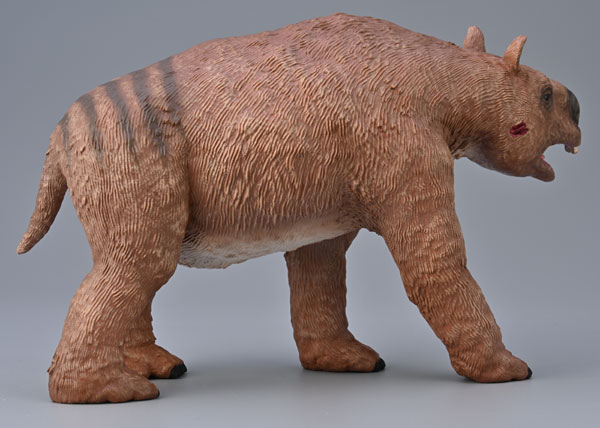New Diprotodon Scale Drawing
Team members at Everything Dinosaur have produced a Diprotodon scale drawing. The scale drawing has been prepared for a fact sheet on the largest marsupial known to science. The fact sheet will be sent out with sales of the new CollectA Deluxe Diprotodon figure.

Diprotodon was the largest marsupial known. Males may have weighed as much as 3,500 kilograms and stood around 1.8 metres high at the shoulder. Picture credit: Everything Dinosaur.
Picture credit: Everything Dinosaur
The CollectA Deluxe Diprotodon Model
The CollectA Deluxe Diprotodon model is due to arrive later this week. Collectors have been eagerly awaiting the arrival of this male Diprotodon figure. The model measures a fraction under twenty-one centimetres in length. It is around twelve centimetres tall, and it has a declared scale of 1:20.
To view the CollectA Deluxe range of prehistoric animal figures: CollectA Deluxe Prehistoric Animal Models.
The CollectA figure probably represents the type species Diprotodon optatum which was the first Australian fossil mammal to be scientifically described and named (Owen 1838).
Numerous species have been erected, essentially due to the great size differences observed in fossil specimens of adults. In addition, Diprotodon was the most widespread of the Australian megafauna. Fossils remains have been found all over Australia and this led to the assumption (probably incorrect), that several different species evolved. Unlike its probable closest living relative the wombat, Diprotodon was sexually dimorphic. Males were considerably bigger than females. It had been assumed that the different sized adult fossils represented separate species. However, it is now thought that the largest specimens represent male Diprotodon optatum.
Did Diprotodon Live in Extensive Herds or Small Family Groups?
Large numbers of Diprotodon fossils have been found in sediments representing lakebeds and river deposits. At one time, Diprotodon was thought to have been aquatic. However, the fossil accumulations probably represent groups that died together during a severe drought or were drowned when trying to cross a swollen river.
Diprotodon is thought to be the only marsupial that seasonally migrated. These animals probably had to roam extensively in order to find enough food. There is some fossil evidence to indicate that these animals moved around in large herds. These large herds mostly consisted of females. This suggests that Diprotodon was a polygynous species. That is, a male controlled a harem of females. Juvenile males moved around in bachelor groups.
The jaws are extremely powerful. It has been suggested that the males engaged in intraspecific combat, perhaps fighting over mates or social status. The incisors were probably used to deliver deep bites onto the face and body of the opponent.
The CollectA Deluxe Diprotodon figure will be in stock at Everything Dinosaur.
Visit the user friendly Everything Dinosaur website: Prehistoric Animal Models and Toys.


